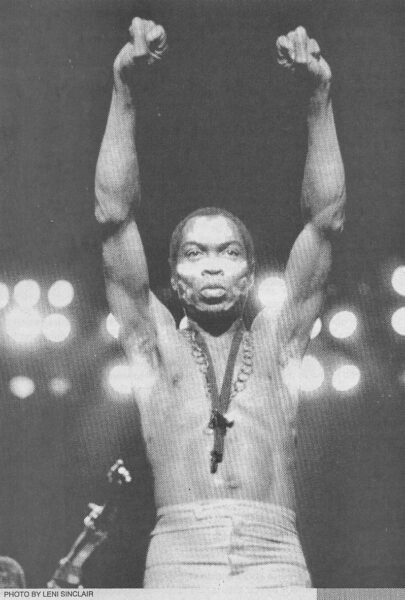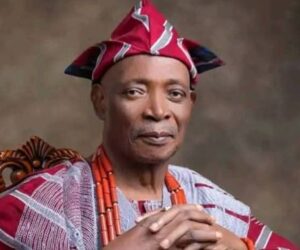One of the lines of Nigeria’s former National Anthem says that ‘The labour of our hero’s past shall never be in vain’. It is for such a line that the patriotic labour of the legendary Fela Anikulapo Kuti towards a better Nigeria through his fiery and sarcastic style of music – which attacked corrupt leadership and government (yabis) – remains an asset this country will cherish forever; SUNNY IDACHABA writes.
The popular Fela who died in 1997 was a musician and political activist regarded as the principal innovator of the kind of music styled afrobeat, a genre that combines West African music with American funk and jazz.
The best way to describe Fela is that he was an unrepentant critic and hater of military regimes and everything associated with bad governance for which he used his music to satirise those in power.
Fela was an outspoken critic of the military, especially in the 70s, for which he became a target. Stretching his disdain for the military too far, in 1970, he founded the metaphorical Kalakuta Republic and declared it independent from military rule. The republic was however destroyed in a raid that injured him and his mother who never recovered from that fatality.
Despite that, Fela continued in his radicalism through music up to 1984 during the military regime of General Muhammadu Buhari who jailed him for 20 months. After he was released in 1985 by the regime of General Ibrahim Babangida, he took his radicalism to another level.
In the 70s, Fela set up a nightclub in a hotel called Empire and later named it Afrika Shrine where he performed regularly. Many Lagosians found the place as a shelter and relief from the daily stress. There, he also personalised his Yoruba traditional ceremonies in honour of his native ancestral faith, which is African traditional worship.
Apart from the changes he made to his name to deviate from the Western-styled meaning, which according to him is slavery, he sang all his songs in Pidgin English so that individuals all over Africa could enjoy his music despite the continent’s diverse dialects.
His music was popular among the Africans in general; however, as popular as it was in Nigeria and elsewhere, it was unpopular with the government. No wonder the regular and frequent raids on his Kalakuta Republic where he performed.
In 1977, he and his Africa 70 Band released an album titled
Zombie, which heavily criticised the Nigerian soldiers. This culminated in the fracas at his Kalakuta Republic leading to burning down of the shrine and the death of his mother. He used Zombie as a metaphor to describe the military’s cruelty and inhumanity.
The album, though a massive success, infuriated the government. The aftermath of the raid was that his elderly mother (the first woman to drive a car in Nigeria) was thrown down through a window and she got seriously injured. In the aftermath, his shrine was burnt down, the studio, instruments and master tapes were destroyed. In response to the attack and death of his mother, he took the coffin to Dodan Barracks gate, Lagos, where Gen. Olusegun Obasanjo as Head of State resided. Thereafter, he wrote two songs, ‘Coffin for Head of State’ and ‘Unknown Soldier’, referencing the official inquiry that claimed ‘unknown soldiers’ carried out the dastardly act.
In defiance of societal norms, in 1978, he married 27 women, many of whom worked for him as dancers, composers and singers all in one day. The marriage, he claimed, not only marked the anniversary of the attack on the Kalakuta Republic but also to protect him and his wives from authorities’ false claims that he used to kidnap women.
That year too, he organised two concerts, first in Accra in which a riot broke out during the rendition of ‘Zombie’, the reason for which he was later banned from entering Ghana. The second was after the Berlin Jazz Festival in which most of his musicians deserted him due to rumours that he planned to use all of the proceeds from the concert to fund his presidential ambition in the run-up to the 1979 General Election in Nigeria.
True to the rumour, he had formed a political party which he called Movement of the People (MOP) in which he planned to ‘clean up society like a mop’, but the ambition died on arrival because of his confrontations with the government. Again, in 1983, he nominated himself for the position of the president, but his candidature was refused. At this time, he created a new band called Egypt 80 which reflected the view that Egyptian civilisation and religious systems are African and must be claimed as such.
In an interview, he stated that, “I have to make Africans aware of the fact that Egyptian civilisation belongs to Africans. So, that was the reason I changed the name of my band to Egypt 80.”
Fela was indeed radical in his world view towards what was happening in the country. He was adjudged to be right considering the level of malfeasance and corruption in the country at that time. It is therefore better to see him as the proverbial baby that should not be thrown away with the bathing water but as the message rather than the messenger.
Maybe this was the reason nearly three decades after his death, he was inducted into the 2025 Grammy Hall of Fame, especially for his classic album, Zombie. For this honour, he joined the likes of Jay Z, late Michael Jackson and several others who belonged to the exclusive league of the Grammy Hall of Fame.
Till date, he is the first and only Nigerian artiste to receive the honour. His inclusion was announced recently by the organisers.
Giving further voice to the person of Fela, Ademola Oshodi, a columnist, said Nigeria’s most enduring soft power asset is not just in her oil reserves or economic policies; it is in her culture and creative industries. According to him, no single figure embodies that cultural influence more than Fela.
“His music, his activism and global recognition, place him among the most potent soft power figures Africa has ever produced, shaping perceptions of Nigeria far beyond its borders. Fela was more than a musician; he was and remains, a diplomatic asset; a living embodiment of Nigeria’s soft power whose cultural, political and pan-African Zombie that mocked the blind obedience of soldiers equally caused revolt in Ghana.
“That the Nigerian military saw Fela as a threat is precisely what makes him a soft power asset today. His defiance against authoritarianism captured so powerfully in his art resonates with democratic ideals and gives Nigeria moral authority in global conversations on justice and freedom. Without a doubt, had Fela lived during the June 12, 1993 saga, he would have been a resonant voice that gives the country a unique global currency that few nations possess.
“Fela was a tireless activist with an indomitable spirit who not only led the fight against military juntas in Nigeria but also inspired opposition to the Apartheid regime in South Africa and colonialism in general through songs like ‘Beasts of No Nation’ and ‘Upside Down’. In ‘Beasts of No Nation’, for instance, he vigorously challenged the powers that-be for sustaining the apartheid regime and the album cover had caricatures of Margaret Thatcher, Ronald Reagan and Pieta Botha amongst others,” he said.
Again, just recently in Lagos, Fela’s presence and his legacies through contemporary showcases and exhibitions of his works from Lagos to London, Germany, Brazil, France, Egypt and other countries took centre stage.
In attendance were Laurent Favier, Consul General of the French Embassy; Emmanuelle Harang, Cultural Attaché of the French Embassy; The Kuti family consisting of Yeni Kuti, Femi Kuti, Seun Kuti, Made Kuti; Papa Omotayo, Seun Alli, Omoboye Odu and Ecobank representatives.
Speaking on why the exhibition in Lagos, Seun Alli said, “Too often, Fela is reduced to a handful of catchphrases and uninformed stories about ‘Zombie’, ‘Water No Get Enemy’, the Kalakuta fire, marrying 27 women, or even the unfounded claim that he performed on stage in his underwear.
“Curating Afrobeat rebellion in Lagos is a deliberate refusal of this flattening. It aims to reposition Fela not merely as a musician or rebel, but as a public intellectual whose music and philosophy are deeply intertwined with Africa’s social, political, and intellectual histories.
“His work was never just style or spectacle; it was a catalyst of revolt and hope, the soundtrack for those living under oppression, corruption and the daily failures of power. Nearly three decades after his passing, it remains a profound mystery how Abami Eda’s philosophy continues to resonate so powerfully across all facets of our shared human experience,” he said.
Laurent Favier said, “Supporting the Afrobeat Rebellion in Lagos reflects our belief that culture is a bridge. It is a logical and welcome follow-up to the successful exhibition in Paris. This project is both a celebration of Franco-Nigerian collaboration and a cultural gift, honoring Fela’s legacy who was very appreciated in France while deepening the dialogue between our two nations. France has always been a heartland for Fela Kuti, supporting not only his music but also his activism.”
Fela Anikulapo Kuti wasn’t just a musician; he was an enigma whose works still resonate nearly 30 years after his exit from planet earth. His music still re-enacts protests against the evils that had pervaded the society in which he lived. It is for this reason that he remains an unforgettable hero.






